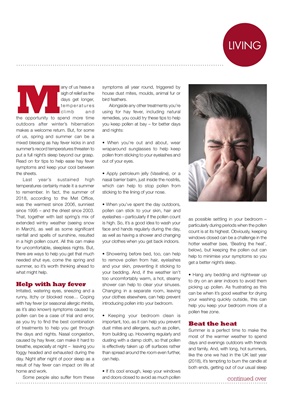
KITLIVING
continued over
M
any of us heave a
sigh of relief as the
days get longer,
temperatures
climb and
the opportunity to spend more time
outdoors after winter's hibernation
makes a welcome return. But, for some
of us, spring and summer can be a
mixed blessing as hay fever kicks in and
summer's record temperatures threaten to
put a full night's sleep beyond our grasp.
Read on for tips to help ease hay fever
symptoms and keep your cool between
the sheets.
Last year's sustained high
temperatures certainly made it a summer
to remember. In fact, the summer of
2018, according to the Met Office,
was the warmest since 2006, sunniest
since 1995 - and the driest since 2003.
That, together with last spring's mix of
extended wintry weather (seeing snow
in March), as well as some significant
rainfall and spells of sunshine, resulted
in a high pollen count. All this can make
for uncomfortable, sleepless nights. But,
there are ways to help you get that much
needed shut eye, come the spring and
summer, so it's worth thinking ahead to
what might help.
Help with hay fever
Irritated, watering eyes, sneezing and a
runny, itchy or blocked nose… Coping
with hay fever (or seasonal allergic rhinitis,
as it's also known) symptoms caused by
pollen can be a case of trial and error,
as you try to find the best combination
of treatments to help you get through
the days and nights. Nasal congestion,
caused by hay fever, can make it hard to
breathe, especially at night - leaving you
foggy headed and exhausted during the
day. Night after night of poor sleep as a
result of hay fever can impact on life at
home and work.
Some people also suffer from these
symptoms all year round, triggered by
house dust mites, moulds, animal fur or
bird feathers.
Alongside any other treatments you're
using for hay fever, including natural
remedies, you could try these tips to help
you keep pollen at bay - for better days
and nights:
• When you're out and about, wear
wraparound sunglasses to help keep
pollen from sticking to your eyelashes and
out of your eyes.
• Apply petroleum jelly (Vaseline), or a
nasal barrier balm, just inside the nostrils,
which can help to stop pollen from
sticking to the lining of your nose.
• When you've spent the day outdoors,
pollen can stick to your skin, hair and
eyelashes - particularly if the pollen count
is high. So, it's a good idea to wash your
face and hands regularly during the day,
as well as having a shower and changing
your clothes when you get back indoors.
• Showering before bed, too, can help
to remove pollen from hair, eyelashes
and your skin, preventing it sticking to
your bedding. And, if the weather isn't
too uncomfortably warm, a hot, steamy
shower can help to clear your sinuses.
Changing in a separate room, leaving
your clothes elsewhere, can help prevent
introducing pollen into your bedroom.
• Keeping your bedroom clean is
important, too, as it can help you prevent
dust mites and allergens, such as pollen,
from building up. Hoovering regularly and
dusting with a damp cloth, so that pollen
is effectively taken up off surfaces rather
than spread around the room even further,
can help.
• If it's cool enough, keep your windows
and doors closed to avoid as much pollen
as possible settling in your bedroom -
particularly during periods when the pollen
count is at its highest. Obviously, keeping
windows closed can be a challenge in the
hotter weather (see, 'Beating the heat',
below), but keeping the pollen out can
help to minimise your symptoms so you
get a better night's sleep.
• Hang any bedding and nightwear up
to dry on an airer indoors to avoid them
picking up pollen. As frustrating as this
can be when it's good weather for drying
your washing quickly outside, this can
help you keep your bedroom more of a
pollen free zone.
Beat the heat
Summer is a perfect time to make the
most of the warmer weather to spend
days and evenings outdoors with friends
and family. And, with long, hot summers,
like the one we had in the UK last year
(2018), it's tempting to burn the candle at
both ends, getting out of our usual sleep